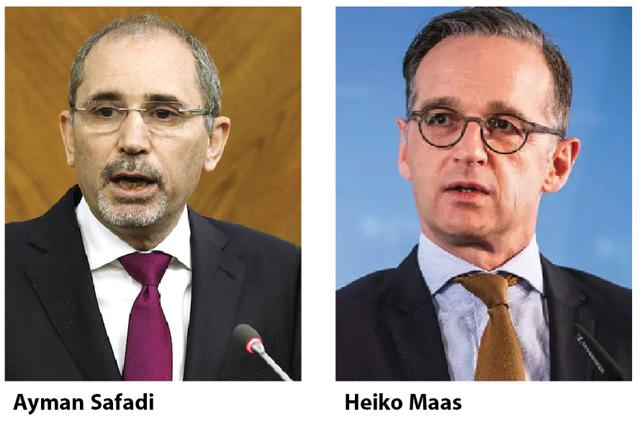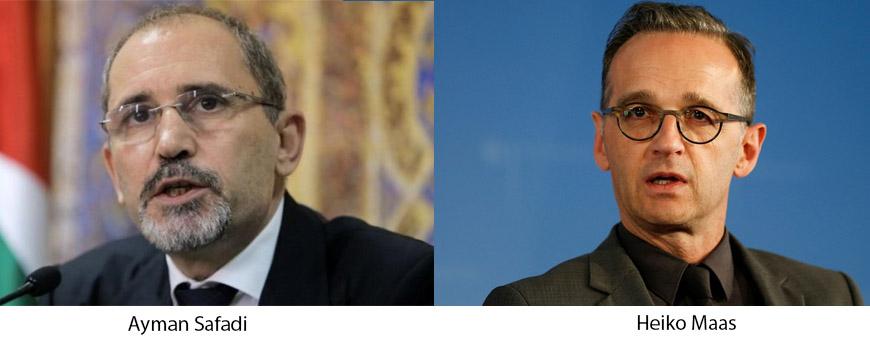You are here
Jordan, Germany reaffirm shared stance on two-state solution
By Maram Kayed - Jun 10,2020 - Last updated at Jun 10,2020

AMMAN — German Foreign Minister Heiko Maas’ fourth visit to the Kingdom “affirms the strength” of Jordanian-German relations and underscores the two countries’ shared stance on the two-state solution to the Palestinian-Israeli conflict, Minister of Foreign Affairs Ayman Safadi said on Wednesday.
Speaking during a joint press conference with Maas at the Foreign Ministry, Safadi highlighted Germany’s role as a key partner and the second-largest bilateral donor to Jordan, hailing the Jordanian-German partnership developed by His Majesty King Abdullah and German Chancellor Angela Merkel.
Prior to the press conference, the two ministers held trilateral talks with Palestinian Prime Minister Mohammad Shtayyeh and Palestinian Foreign Minister Riyad Maliki, during which they discussed “finding horizons to prevent the Israeli annexation of Palestinian land and a return to negotiations”.
In remarks to The Jordan Times, Safadi asserted that the annexation “paves the way for institutionalised apartheid in Palestine” and is “a flagrant violation of international law that cannot go unanswered”.
He added: “It is a grave concern that undermines the peace process and threatens regional security and stability.”
For his part, Maas said that he had discussed the possibility of reviving negotiations between the Palestinians and the Israelis during the trilateral talks.
“We are very worried about the repercussions of the annexation decision. We in the EU agree and are committed to the two-state solution and reject unilateral action and plans to annex. We believe that now is the time for diplomacy to bring the two sides to the negotiation table,” Maas said.
Jordan will continue working with international partners to prevent the annexation to spare the region further conflicts, Safadi noted.
Safadi highlighted the Jordanian-German cooperation in the refugee crisis, anti-terror front, economic development and regional crises.
Maas said that Germany had decided to expand its assistance to the anti-Daesh operations in Syria and Iraq, adding that Berlin is “determined to pay attention” to this issue with the anti-Daesh coalition.
Safadi said that Germany is a “vital partner” in resolving regional crises, underlining that this visit amid the pandemic is an “indicator of the German commitment to resolving conflicts and achieving a just comprehensive peace”.
Moving on to issues of international concern, most notably the coronavirus pandemic, Maas said that Germany is “keen on continuing bilateral and multilateral work to put an end to the COVID-19 crisis”, stressing that Jordan is a “valuable partner in this regard”.
“COVID-19 has preoccupied the world, and Jordan’s swift response to the pandemic has earned the world’s respect,” he added.
Maas said that Germany is “happy to support” Jordan by providing 23,000 COVID-19 rapid test kits and 32 related equipment.
“This gesture is meant to deepen the partnership with Jordan as well as with the international community in facing shared challenges,” he said.
Safadi voiced appreciation for Germany’s support to enable the Kingdom enhance its anti-COVID-19 preparedness.
Related Articles
AMMAN — Deputy Prime Minister and Foreign Minister Ayman Safadi and German Foreign Minister Heiko Maas on Wednesday discussed means to devel
AMMAN — Foreign Minister Ayman Safadi and his German counterpart Heiko Maas on Tuesday held a political consultation to further enhance Jord
AMMAN — Germany on Sunday announced that it would grant Jordan a $100-million unconditional loan to support the Kingdom's economic reform pr














